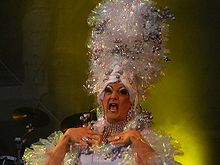- Diva
-
For Diva-related policy on Wikipedia, see Wikipedia:Don't feed the divas.
A diva (English pronunciation: /ˈdiːvə/, Italian: [ˈdiːva]) is a celebrated female singer. The term is used to describe a woman of outstanding talent in the world of opera, and, by extension, in theatre, cinema and popular music. The meaning of diva is closely related to that of "prima donna".
The word entered the English language in the late 19th century. It is derived from the Italian noun diva, a female deity. The plural of the word in English is "divas"; in Italian, dive [ˈdiːve]. The basic sense of the term is "goddess",[1][2] the feminine of the Latin word divus (Italian divo), someone deified after death, or Latin deus, a god.[3] The word is cognate with the Hindu term "Devi" meaning goddess (masculine "Deva" meaning god) which in turn originates from the ancient Sanskrit language, one of the earliest Indo-European languages;[4][5] the word is also cognate with the Avestan term denoting the Zoroastrian concept of the Daevas.
The male form divo exists in Italian and is usually reserved for the most prominent leading tenors, like Enrico Caruso and Beniamino Gigli. The Italian term divismo describes the star-making system in the film industry. In contemporary Italian, diva and divo simply denote much-admired celebrities, especially film actresses and actors, and can be translated as "(film) star".
An extravagant admiration for divas is a common element of camp culture.[6] In contemporary US slang usage, the term "diva" may be used to signify the female version of a "hustla", exemplified by Beyoncé's 2009 song "Diva".[7]
See also
References
- ^ Online Etymology Dictionary
- ^ TIME magazine observed in its October 21, 2002 issue: "By definition, a diva was originally used for great female opera singers, almost always sopranos."
- ^ Warrack, John and West, Ewan (1992), The Oxford Dictionary of Opera, 782 pages
- ^ Burrow (2001:?)
- ^ Devi, a Proto-Indo-European Goddess
- ^ "Vamps, camps and archetypes: gay men, the diva phenomenon and the inner feminine" by Andrew Milnes (2002)
- ^ "Growing girls into powerful women" by Otis R. Taylor Jr., The State (29 August 2010)
External links
- DivasTheSite.com Opera Divas Page
- "Who'd be an Opera diva?" by John Crace, The Guardian, 4 February 2006, accessed 17 August 2008
Opera terms Aria · Aria di sorbetto · Arioso · Bel canto · Breeches role · Burletta · Cabaletta · Cadenza · Cantabile · Castrato · Cavatina · Chest voice · Claque · Coloratura · Comprimario · Convenienze · Coup de glotte · Da capo aria · Diva · Divertissement · Duodrama · Entr'acte · Fach · Falsetto · Falsettone · Fioritura · Gesamtkunstwerk · Head voice · Hovsångare · Intermezzo · Kammersänger · Leitmotif · Legato · Libretto · Literaturoper · Mad scene · Maestro · Melodrama · Melodramma · Messa di voce · Monodrama · Musico · Opera house · Overture · Passaggio · Portamento · Prima donna · Prompter · Recitative · Regietheater · Répétiteur · Ritornello · Sitzprobe · Spinto · Sprechgesang · Squillo · Stagione · Surtitles · Tessitura · Timbre · Travesti · Verismo · VibratoCategories:- Musical terminology
- Opera terminology
- Italian loanwords
- Narcissism
Wikimedia Foundation. 2010.

